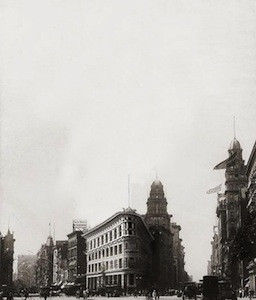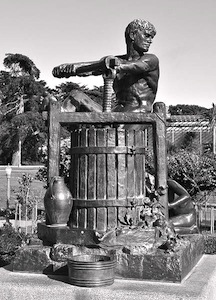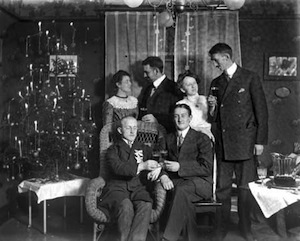April 1, 2011 marks the 100th anniversary of Tor Books. The story of Tor is the story of science fiction in America, a land whose history is marked by the future.
The Tor brothers, Linus and Wilhelm, were born in Mazdaberg, Switzerland, a small Zoroastrian town near Bern. Intrepid and inventive, the brothers were known as risk takers, adventurers and raconteurs of wild tales. As youth they traveled from town to town spinning yarns for whomever might pay them a gilder or florin or whatever currency Swiss folks used back then.
In 1898 they left Switzerland for New York. The reasons for this are uncertain; Wilhelm Tor, jr. says his father decided to depart after spending a long weekend with H. Rider Haggard. Linus in his diary said they fled the growing tide of anti-Zoroastrianism in Europe.
Whatever the reason for the departure, they came to America with only the clothes on their backs and a small makeshift cider press cobbled together from the wreckage of a freighter off the Bernese coast. The Tor brothers sold cider—hot or cold—from a small cart on the corner of 5th and Broadway in Manhattan, the site of the famed Flatiron Building. (Of course, in those days, the building was still flat and made of cast iron. It wasn’t until architect Daniel Burnham redesigned the building with a lighter steel skeleton that it reached its present height.)
 While Linus took care of the financial end of the business, the more extroverted Wilhelm greeted the customers, often engaging them with tall tales. One night, a visiting H.G. Wells, impressed with Wilhelm’s storytelling, recommended that Wilhelm publish stories. Though Linus needed some persuading, they brothers modified the cider press so that it could be used as a printing press at night. This didn’t work perfectly; unreadable cider-stained pages marred early Tor Bros. books (though such editions go for a pretty penny on ebay) and sometimes the cider bore traces of lead.
While Linus took care of the financial end of the business, the more extroverted Wilhelm greeted the customers, often engaging them with tall tales. One night, a visiting H.G. Wells, impressed with Wilhelm’s storytelling, recommended that Wilhelm publish stories. Though Linus needed some persuading, they brothers modified the cider press so that it could be used as a printing press at night. This didn’t work perfectly; unreadable cider-stained pages marred early Tor Bros. books (though such editions go for a pretty penny on ebay) and sometimes the cider bore traces of lead.
In the first few years, Tor Bros. launched the careers of such early science fiction1 legends as A. R. “Skipper” Mulvaney, Cyril H. Christmas, the Vicomte Clerf du Bec and Neil Gaimen (no relation) as well as publishing Henry Miller’s only science fiction novel.2
The publishing and cider business seemed unstoppable. The only threat to the ever-growing Tor Bros. publishing empire came from the pulps (so named for their connection to the orange juice industry), such as Saucy Boy’s Adventure, Tales of the Uncomfortable and Insouciant Malfeasance, all printed and sold for far less than a Tor book. Linus spent night after night drinking cider enhanced with (perfectly legal) cocaine, wracking his brain for a way to beat the pulps at their own game. He took to the streets late each night, wandering the darkness, twitchy and obsessed. One rainy midnight he chanced upon an illegal albatross and penguin fight. As the two poor creatures battled in a bloody frenzy, Linus hallucinated that he saw not two animals but one, a blurry penguitross. And at that moment he also conceived a hybrid of the book and the pulp: a paperback.
That Linus’s invention revolutionized the publishing industry goes without saying, though his later innovation, the Tor Triple Novel, was less successful. Linus pictured three books in a single binding: one printed head to toe, so to speak, another read from the back, rotated 180 degrees, toe to head, and a third, in the center, printed landscape fashion. Linus Tor’s one-time assistant Willy “Ace” Donalhiem later simplified the Triple Novel to a less ambitious—but more successful—double paperback.
 During the Cold War, Tor Bros. shifted from primarily SF titles to fantasy. Science fiction often carried political overtones. Linus, well aware that Zoroastrians were sometimes considered “soft” on communism, wished to remain politically neutral, in true Swiss fashion. The great fantasy success of that era was, of course, 1957’s The Shadow War of the Night Dragons by a then-12 year old John Scalzi.
During the Cold War, Tor Bros. shifted from primarily SF titles to fantasy. Science fiction often carried political overtones. Linus, well aware that Zoroastrians were sometimes considered “soft” on communism, wished to remain politically neutral, in true Swiss fashion. The great fantasy success of that era was, of course, 1957’s The Shadow War of the Night Dragons by a then-12 year old John Scalzi.
In the 1960s, Tor Bros. embraced mind-bending psychedelic fiction, publishing such masterworks as Stranger in the Left Side of the High Castle and Stripping Breakfast (a prequel of sorts to Naked Lunch). Deeply opposed to illegal drug use, Linus Tor insisted that the controversial Getting High and Slamming Junk was not about heroin but rather a story of garbage men in space.
The 1970s was a hard time for Tor Bros.—now simply Tor Books, following Wilhelm Tor’s death by ballooning accident in 1972 and Linus’s retirement not long after—and for science fiction in general, as Americans became more interested in dancing, tightening their trousers and growing mustaches than in reading. But the 1980s saw the rise of the personal computer and a burgeoning class of wealthier geek for whom moustaches were seldom important. Under the leadership of Tom Doherty, formerly Linus Tor’s personal blacksmith, Tor Books regained its prominence in the publishing world. It is currently a subsidiary of Verlagsgruppe Georg von Holtzbrinck, distant relatives of the Tor family and one of the largest non-Zoroastrian publishers in the world.
1. This term came later. Wilhelm Tor preferred wissenschaftlichesvorgebenbuch.
2. The title cannot be printed, even on the internet.
Jason Henninger has visited the Flatiron Building and can confirm that it is much taller now.










